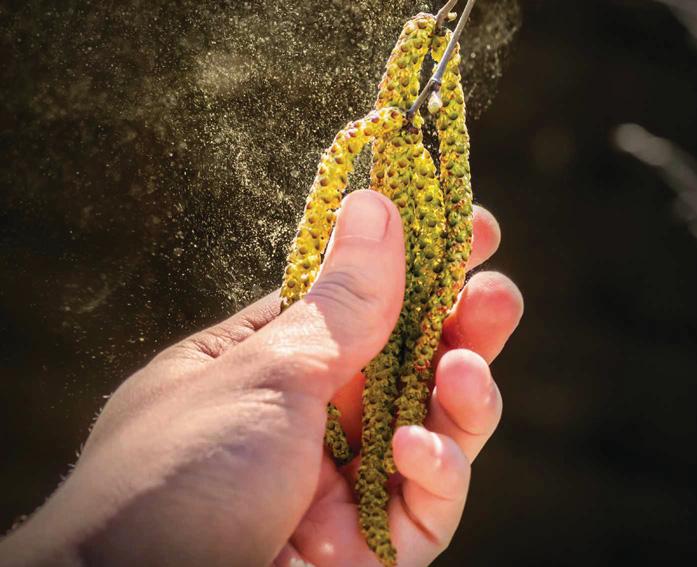試す 金 - 無料
HAY FEVER: IS IT REALLY GETTING WORSE?
BBC Science Focus
|August 2023
Hay fever sufferers say their allergies are getting worse... and climate change could be to blame

Earlier this year the Met Office warned that hay fever could get worse due to climate change. And it's not just a hypothetical problem we may face in the future. In a recent paper, researchers dug into pollen trends over the last 26 years across the UK, focussing on grass, birch and oak pollen, to investigate how changing weather patterns are already affecting hay fever season.
While the work showed that climate change is certainly having an effect, the exact changes depend on which kind of pollen you're affected by. The season for birch pollen (the second most important type when it comes to hay fever, after grass pollen), is increasing in severity - meaning the total amount of pollen seen during the season is higher.
Oak pollen season is also starting earlier and lasting longer. But there's some good news regarding grass pollen: while the first day with high grass pollen levels seems to be getting earlier, the season doesn't appear to be getting worse.
The data in the study only goes as far as 2020, but Dr Beverly Adams-Groom, lead author of the paper and senior palynologist at the University of Worcester, says those trends appear to be continuing.
"The birch pollen season this year and in 2021 were among the very worst that we've ever seen," she says.
Pollen is a fine powder made by plants as part of their reproductive cycle and hay fever is an allergic reaction to proteins found on the pollen when it gets into our eyes, nose and throat.
このストーリーは、BBC Science Focus の August 2023 版からのものです。
Magzter GOLD を購読すると、厳選された何千ものプレミアム記事や、10,000 以上の雑誌や新聞にアクセスできます。
すでに購読者ですか? サインイン
BBC Science Focus からのその他のストーリー

BBC Science Focus
ARE PSYCHOPATHS REALLY THAT GOOD AT LYING?
Picture infamous psychopaths from fiction, such as the eerily cold and calculating Patrick Bateman in the film adaptation of American Psycho, and they certainly seem like master deceivers. But what about real-life psychopaths? Research confirms that psychopaths are more inclined to lie to get what they want, and that they typically display a striking fearlessness - as if they have ice running through their veins.
1 min
January 2026
BBC Science Focus
WHY DO WE HAVE TWO OF SOME ORGANS, BUT ONLY ONE OF OTHERS?
The majority of animals on Earth, humans included, are bilaterally symmetrical. It means we can be divided roughly into two mirror-image sides. Evolutionary biologists believe that it has been like that for at least 300 million years, and because life organised this way survived, so did symmetrical design. Hence, two eyes, two ears, two lungs and two kidneys.
1 min
January 2026

BBC Science Focus
WHY DO CATS PREFER TO SLEEP ON THEIR LEFT?
I've said it before, and I'll keep saying it again and again and again: who knows why cats do anything?
1 min
January 2026

BBC Science Focus
FORGET COUNTING CALORIES TRY THIS INSTEAD...
Calorie counting isn't just difficult, it's riddled with problems that make it practically useless for anyone trying to lose weight.But there are alternatives
9 mins
January 2026

BBC Science Focus
SIGNS OF LIFE
The more planets we find outside our Solar System, the better our chances are of finding life on one of them. But if there really is life out there, how do we spot it?
8 mins
January 2026
BBC Science Focus
WHAT ACTUALLY MAKES SOMEBODY COOL?
Most of us have probably wanted to be cool at some point in our lives, and these efforts can have a big influence on the things we buy, the way we dress, the hobbies we invest in, the people we look up to and even the words we use.
2 mins
January 2026

BBC Science Focus
It's TIME to WAKE UP and SMELL the roses
What if the pursuit of happiness in the traditional sense – chasing wealth or power – is the very thing stopping you from being happy? Researchers are beginning to understand that spending time enjoying the simple things might be the secret ingredient to enjoying a happy, healthy life
8 mins
January 2026

BBC Science Focus
THE AARDVARK
In a time when people are being asked to consider eating insects, we should, perhaps, learn a thing or two from the aardvark (Orycteropus afer), Africa’s ant-guzzling gourmand. On an average night, the big-schnozzed mammal devours up to 50,000 of the crunchy critters.
2 mins
January 2026

BBC Science Focus
ADD WEIGHT TO LOSE WEIGHT
A very basic kind of wearable could make your New-Year-weight-loss plans stick
3 mins
January 2026

BBC Science Focus
AHEAD OF THEIR TIME
The Maya civilisation is known for its art and architecture.
8 mins
January 2026
Translate
Change font size
